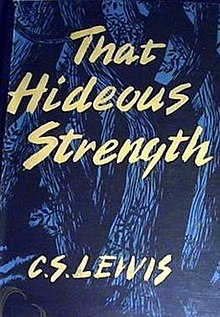 First edition cover | |
| Author | C. S. Lewis |
|---|---|
| Language | English |
| Series | Space Trilogy |
| Genre | Science fiction novel, dystopia[1] |
| Publisher | The Bodley Head |
Publication date | 1945 |
| Publication place | United Kingdom |
| Media type | Print (hardback and paperback) |
| Pages | 384 pp |
| Preceded by | Perelandra |
| Part of a series on |
| Human enhancement |
|---|
 |
That Hideous Strength: A Modern Fairy-Tale for Grown-Ups (also released under the title The Tortured Planet in an abridged format) is a 1945 novel by C. S. Lewis, the final book in Lewis's theological science fiction Space Trilogy. The events of this novel follow those of Out of the Silent Planet and Perelandra (also titled Voyage to Venus) and once again feature the philologist Elwin Ransom. Yet unlike the principal events of those two novels, the story takes place on Earth rather than elsewhere in the Solar System. The story involves an ostensibly scientific institute, the National Institute for Co-ordinated Experiments (N.I.C.E.), which is a front for sinister supernatural forces.
The novel was heavily influenced by the writing of Lewis's friend and fellow Inkling Charles Williams, and is markedly dystopian in style. In the foreword, Lewis states that the novel's point is the same as that of his 1943 non-fiction work The Abolition of Man, which argues that there are natural laws and objective values that education should teach children to recognise.
The novel's title is taken from a poem written by David Lyndsay in 1555, Ane Dialog betuix Experience and ane Courteour, also known as The Monarche. The couplet in question, "The shadow of that hyddeous strength, sax myle and more it is of length", refers to the Tower of Babel.[2]
- ^ Tom Moylan; Raffaella Baccolini (2003). Dark horizons: science fiction and the dystopian imagination. Taylor and Francis Books. ISBN 0-415-96613-2. Retrieved 29 July 2011.
- ^ Lyndsay's Middle Scots usage of strength was in the now archaic meaning of "fortress, stronghold", see also OED s.v. strength, n.: "10.a. A stronghold, fastness, fortress. Now arch. or Hist., chiefly with reference to Scotland."